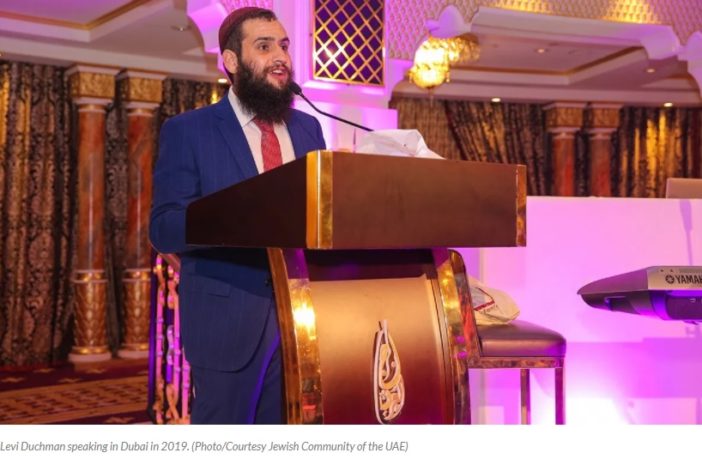The menu at Armani Kaf, a restaurant at a hotel in downtown Dubai, features a “glatt kosher” steak. In fact, many hotels in Dubai now operate kosher kitchens. Imports of kosher wine to the United Arab Emirates are increasing, as well, and there are Jewish prayer quorums meeting daily in Abu Dhabi.
Those are just a few of the signs of a “flourishing” of Jewish life in the Gulf nation, according to the new Chabad emissary there.
In October, Chabad-Lubavitch announced the appointment of Rabbi Levi Duchman as the movement’s first representative in the UAE, which has an estimated Jewish population of 2,000 to 3,000. Duchman, who has lived in the UAE for six years, spoke about his experiences there during a Nov. 8 Zoom event hosted by several Northern California Chabad centers. The talk, “New Frontiers of Judaism in the Arab World,” also included his brother-in-law, Rabbi Levi Banon, who leads a Chabad center in Morocco.
“[The UAE] is a very welcoming country, open country, tolerant country,” Duchman said, noting that the Jewish community enjoys “strong support” from Sheikh Mohammed bin Zayed Al Nahyan, the 59-year-old crown prince of Abu Dhabi and the UAE’s de facto ruler. “When people would ask me if it’s dangerous to walk on the streets, I would tell them in the summer days, it’s very dangerous to walk on the streets just from the heat,” he joked.
The UAE and Israel agreed to normalize relations in August as part of the Abraham Accords, an agreement brokered by the United States that was later joined by Bahrain.
Duchman, who attended the signing ceremony at the White House in September, said he expects more Israeli and Jewish tourists to visit the UAE as a result of the agreement and recent social reforms. (Less than a week ago, the UAE government made a surprise announcement that it would immediately loosen some of its strict Islamic laws governing personal behavior, such as the consumption of alcohol.)
Rabbi Shmulik Friedman, program director at Chabad SF’s SoMa Shul, said it used to be “a whole big spiel” for one of his religiously observant relatives to conduct business in the UAE, and Israeli-passport holders were not even permitted to enter the country. “Now, the opportunities that are opening up are really amazing,” Friedman told J. after the talk. “I would love to go there at some point, with a community group, to visit and explore the country.”
As for Morocco, it was the first overseas locale to which Rabbi Menachem Mendel Schneerson sent shlichim (emissaries) in 1950, according to Banon, the Chabad rabbi in Casablanca. “When all the other Jewish institutions were looking at other countries and were forgetting about the Arab world, the Rebbe was the only one to start sending [emissaries] to Muslim countries,” Banon said.
During the talk, Banon boasted about the Jewish infrastructure in Casablanca: 20 synagogues, seven kosher restaurants, four Jewish community centers and two Jewish schools. He said Jewish families are moving to Morocco from France to escape the resurgence of antisemitism there.
“We have couples moving down from France who feel that life is so much safer in Casablanca than in Paris, as funny as it may sound,” Banon said.
The son of Moroccan parents, Banon grew up in Montreal but has lived for many years in Casablanca, largely developing programming for local Jewish youth. “In a Muslim, third-world country, there’s a lot of children that are growing up in poverty,” he said. “We’re giving them opportunities, spiritual and material opportunities, that they wouldn’t have had, if not for our programs.”
As in the UAE, relations between Morocco’s Jews and the ruling authorities are good, Banon said. “It’s fascinating to see the respect and the veneration that we get from the royal family,” he said. (In recent years, King Mohammed VI has invested heavily in protecting the country’s Jewish history and culture, including by renovating Jewish synagogues and cemeteries.)
Asked during the talk about women’s rights in the Arab world, Banon replied, “We really have something to learn from our Muslim brethren about their modesty.”
Both Duchman and Banon expressed optimism about the development of Jewish life in their respective countries, and in the Arab world more broadly.
“You know, we’ve had quite a few years where, with the Muslim communities, things were tough,” Banon said. “And now I think, especially with the Abraham Accords, as a Jewish community at large, we’re looking at a bright future.”
J. covers our community better than any other source and provides news you can’t find elsewhere. Support local Jewish journalism and give to J. today. Your donation will help J. survive and thrive!Support J.

Andrew Esensten is a freelance journalist in San Francisco. Previously, he was a staff writer for the English-language edition of Haaretz based in Tel Aviv. Follow @esensten







